1 Samuel 3 meaning explained in AI Summary
This chapter marks a turning point in Israel's history, transitioning from the failing leadership of Eli to the rise of Samuel as a prophet.
Eli's Failing Leadership: The chapter opens with a bleak picture of Israel's spiritual state. Eli, the priest and judge, is old and his sons, Hophni and Phinehas, are corrupt, abusing their positions and disrespecting God's offerings.
God Calls Samuel: In this context of spiritual darkness, God chooses to reveal himself to a young boy named Samuel, who serves in the tabernacle under Eli's guidance.
- The Call: God calls Samuel's name three times at night. Each time, Samuel mistakes the voice for Eli's and runs to him.
- Eli's Guidance: Finally, Eli realizes it is God calling Samuel and instructs him to respond, "Speak, Lord, for your servant is listening."
- God's Message: God reveals to Samuel his judgment on Eli's house because of the wickedness of his sons. He declares that Eli's family will be cut off from the priesthood.
Samuel's Faithfulness: Despite the weight of the message, Samuel faithfully delivers God's words to Eli the next morning. Eli humbly accepts the judgment, acknowledging God's sovereignty.
Samuel's Rising Influence: As Samuel grows, the Lord continues to reveal himself to him. Samuel's words prove true, and he gains a reputation as a prophet throughout Israel. The people recognize him as God's chosen leader.
Key Themes:
- God's Sovereignty: God is in control, even when human leadership fails.
- Judgment and Grace: God judges sin, but also shows grace by raising new leadership.
- The Importance of Obedience: Samuel's willingness to listen and obey God's call sets him apart.
- The Power of Prophecy: God's word, spoken through Samuel, brings about change and guides the nation.
This chapter sets the stage for Samuel's leadership and the future of Israel. It highlights the importance of faithfulness, obedience, and the power of God's word.
1 Samuel 3 bible study ai commentary
The calling of Samuel marks a pivotal transition in Israel's history. It signifies the end of the corrupted priestly era under Eli and the beginning of the prophetic age, which would guide Israel toward the monarchy. God bypasses the established, but spiritually numb, institution to raise a new, humble servant who is attentive to His voice. The chapter is a powerful narrative about spiritual receptivity versus spiritual dullness, demonstrating that God's revelation is not bound by age, status, or office, but by a listening heart.
1 Samuel 3 Context
The chapter is set during the turbulent period of the Judges, a time of spiritual decay and political instability summarized by the phrase, "everyone did what was right in his own eyes" (Judges 21:25). The central sanctuary was at Shiloh, housing the Ark of the Covenant, but the priesthood, led by Eli and his wicked sons Hophni and Phinehas, was corrupt (1 Samuel 2:12-17, 22). This corruption created a spiritual famine, a time when direct revelation from God was exceedingly rare. This context makes God's direct, personal call to a young boy both shocking and deeply significant, signaling a divine course correction for the nation.
1 Samuel 3:1
The boy Samuel ministered before the Lord under Eli. In those days the word of the Lord was rare; there were not many visions.
In-depth-analysis
- The boy Samuel: The narrative repeatedly emphasizes Samuel's youth to contrast his spiritual openness with Eli's elderly spiritual decay.
- Ministered before the LORD: The Hebrew sharath implies active, priestly service, even for a child. Samuel was not just an errand boy; he was officially dedicated and serving in the Tabernacle.
- Under Eli: Samuel served within the established religious system, yet God chose to bypass the head of that system (Eli) to speak to the subordinate.
- Word of the LORD was rare: The Hebrew phrase dabar YHWH... yaqar means the word was precious, valuable because it was so scarce. Divine communication had nearly ceased due to the priesthood's sin and the people's apathy.
- Not many visions: This indicates a lack of prophetic revelation. The spiritual silence was deafening, making the subsequent events even more dramatic.
Bible references
- Amos 8:11-12: "‘...a famine on the land—not a famine of bread... but of hearing the words of the LORD. People shall... run to and fro, to seek the word of the LORD, but they shall not find it.’" (Describes the exact situation in Samuel's youth).
- Judges 21:25: "In those days there was no king in Israel. Everyone did what was right in his own eyes." (The spiritual chaos Samuel was born into).
- Psalm 74:9: "We are given no signs from God; no prophets are left, and none of us knows how long this will be." (A lament for the silence of God).
Cross references
Prov 29:18 (vision-less people perish); Lam 2:9 (law and prophets are no more); Ezek 7:26 (disaster upon disaster).
1 Samuel 3:2-3
And it happened at that time, while Eli was lying down in his place, and when his eyes had begun to grow so dim that he could not see, and before the lamp of God went out in the tabernacle of the Lord where the ark of God was, and while Samuel was lying down...
In-depth-analysis
- Eli... eyes had begun to grow so dim: This is both a physical reality of old age and a potent metaphor for his lack of spiritual perception. He cannot "see" what God is doing.
- Lamp of God went out: Literally, this pinpoints the time as just before dawn, as the lamp was to be tended "from evening to morning" (Exo 27:21). Symbolically, it suggests that God's presence and hope for Israel, while flickering and about to be extinguished, had not yet been completely removed. There was still a window for intervention.
- Where the ark of God was: Samuel's sleeping place in the hekhal (holy place), in proximity to the Holy of Holies, contrasts sharply with Eli sleeping "in his place." Samuel is positioned near the very presence of God, primed for a divine encounter.
Bible references
- Exodus 27:20-21: "you shall command the people of Israel that they bring to you pure beaten olive oil for the light, that a lamp may regularly be set up to burn." (The basis for the lamp in the tabernacle).
- Leviticus 24:2-4: "Command the people of Israel to bring you pure oil... Aaron shall arrange it... continually before the LORD." (Details on maintaining the lamp's flame).
- Revelation 2:5: "Remember therefore from where you have fallen; repent... If not, I will come to you and remove your lampstand from its place..." (The lamp as a symbol of the divine presence in a community).
Cross references
Deu 34:7 (Moses's eyes not dim); 1 Sam 4:15 (Eli's blindness confirmed); Psa 18:28 (You light my lamp).
1 Samuel 3:4-10
that the Lord called Samuel. And he answered, “Here I am!” So he ran to Eli... Eli perceived that the Lord had called the boy... So Eli said to Samuel, “Go, lie down; and it shall be, if He calls you, that you must say, ‘Speak, Lord, for Your servant is listening.’”... The Lord came and stood, and called as at other times, “Samuel! Samuel!” And Samuel answered, “Speak, for Your servant is listening.”
In-depth-analysis
- "Here I am!": Samuel’s response (Hinneni) is the classic reply of a servant ready for a command, demonstrating his immediate obedience, even though he misunderstands the source of the call.
- Three Calls: The repetition of the call three times emphasizes both Samuel's persistence in responding and Eli's profound spiritual dullness. He required multiple prompts to realize God was at work.
- "Did not yet know the LORD": Verse 7 clarifies this does not mean Samuel was godless. It means he had never before experienced a direct, personal, prophetic revelation from Yahweh. His knowledge was based on instruction, not direct encounter.
- "Speak, for Your servant is listening": Eli's instruction is key. The Hebrew for "listening" is shomea`, from the root shama`, which means to hear, listen, and obey. This is the posture required for revelation.
- Came and stood: This fourth call is more intense. The Hebrew natsab implies God taking a stationary, personal stance, indicating the gravity of the impending message. He is no longer a distant voice but a present reality.
- "Samuel! Samuel!": The repetition of a name signifies importance and intimacy in a divine call (e.g., Abraham, Abraham; Moses, Moses).
Bible references
- Exodus 3:4: "When the LORD saw that he turned aside to see, God called to him out of the bush, 'Moses, Moses!' And he said, 'Here I am.'" (Parallels a divine call narrative).
- Isaiah 6:8: "And I heard the voice of the Lord saying, 'Whom shall I send, and who will go for us?' Then I said, 'Here I am! Send me.'" (The ready response of a true prophet).
- Luke 10:21: "...you have hidden these things from the wise and understanding and revealed them to little children..." (Echoes the theme of God revealing His will to the humble child, not the wise priest).
Cross references
Gen 22:1 (Abraham's "Here I am"); Acts 9:4 (Saul, Saul); Luke 1:38 (Mary's submission).
1 Samuel 3:11-14
Then the Lord said to Samuel: “Behold, I will do something in Israel at which both ears of everyone who hears it will tingle... In that day I will perform against Eli all that I have spoken concerning his house... because his sons made themselves vile, and he did not restrain them... the iniquity of Eli’s house shall not be atoned for by sacrifice or offering forever.”
In-depth-analysis
- Ears... will tingle: A Hebrew idiom for news so shocking and terrible it creates a physical sensation. It is reserved for announcing catastrophic judgment.
- Perform against Eli all that I have spoken: God's message to Samuel is not new; it is a direct confirmation and finalization of the sentence already delivered by the "man of God" in 1 Samuel 2:27-36. God is true to His word.
- He did not restrain them: Eli’s sin was not just that his sons were wicked, but that he, as father and High Priest, was passive. He knew of their blasphemy (meqallim, "to curse" God or treat lightly) and failed in his duty to remove them from office and uphold God's holiness.
- Not be atoned for... forever: This is one of the most severe judgments in the Old Testament. The sin of desecrating the priesthood was so high-handed and persistent that no sacrifice under the Mosaic system could cover it. It was an unpardonable offense for that office.
Bible references
- 1 Samuel 2:29-36: "Why do you scorn my sacrifice...? ...I will cut off your strength..." (The original prophecy now being sealed).
- 2 Kings 21:12: "...I am bringing such disaster upon Jerusalem and Judah that the ears of everyone who hears of it will tingle." (The same idiom used for the judgment on Manasseh's sins).
- Hebrews 10:26: "For if we sin deliberately after receiving the knowledge of the truth, there no longer remains a sacrifice for sins, but a fearful expectation of judgment..." (The New Testament principle of willful, unrepentant sin).
Cross references
Jer 19:3 (ears tingling); Num 15:30-31 (sin of a "high hand"); 1 Kgs 2:27 (fulfillment of the prophecy).
1 Samuel 3:15-18
And Samuel lay until morning... But Samuel was afraid to tell Eli the vision... So Eli called Samuel... “What is the word that the Lord said to you?...” Samuel told him everything... And he said, “It is the Lord. Let Him do what seems good to Him.”
In-depth-analysis
- Afraid to tell Eli: Samuel's fear is understandable. He is a child tasked with delivering a message of utter doom to his master, guardian, and the nation's high priest.
- Eli's Oath: Eli forces the truth from Samuel with a priestly curse ("God do so to you and more also..."). He suspects the message is for him and needs to know it.
- "It is the LORD. Let Him do what seems good to Him": Eli's response is one of resigned submission, not true repentance. He recognizes the source and sovereignty of the judgment but makes no final attempt to repent or intercede. It reflects a fatalistic acceptance of his family's fate.
Bible references
- Job 1:21: "...The LORD gave, and the LORD has taken away; blessed be the name of the LORD." (A posture of complete submission to God's sovereign will in tragedy).
- 2 Samuel 15:26: "But if he says, ‘I have no pleasure in you,’ behold, here I am, let him do to me what seems good to him.” (King David's similar submission during Absalom's rebellion).
- Leviticus 10:3: "...And Aaron held his peace." (Aaron's silent submission after his sons Nadab and Abihu are consumed by fire for offering strange fire).
Cross references
Psa 39:9 (I am mute...); Isa 39:8 (Hezekiah's selfish response to judgment).
1 Samuel 3:19-21
So Samuel grew, and the Lord was with him and let none of his words fall to the ground. And all Israel from Dan to Beersheba knew that Samuel had been established as a prophet of the Lord. And the Lord appeared again at Shiloh, for the Lord revealed himself to Samuel at Shiloh by the word of the Lord.
In-depth-analysis
- The LORD was with him: This is a covenantal formula indicating divine blessing, presence, and success, used for patriarchs, leaders, and kings like Joseph, Moses, and David.
- Let none of his words fall to the ground: A powerful idiom signifying that Samuel's prophecies were 100% accurate and divinely inspired. Everything he spoke on behalf of God came to pass, establishing his authority.
- From Dan to Beersheba: A well-known geographical marker encompassing the entire territory of Israel, from the northernmost city to the southernmost. It signifies that Samuel's reputation and authority were universally recognized.
- Established as a prophet: The Hebrew ne'eman means he was confirmed, found to be faithful and trustworthy. Israel recognized him as a genuine spokesman for God.
- Revealed himself... by the word: The spiritual famine is officially over. God is now communicating with Israel again, and Samuel is the chosen vessel. The "word of the LORD," once rare (v. 1), is now the means of God's self-revelation at Shiloh.
Bible references
- Genesis 39:2: "The LORD was with Joseph, and he became a successful man..." (The promise of divine presence and success).
- Joshua 1:9: "...Do not be frightened... for the LORD your God is with you wherever you go." (The divine commission including the promise of God's presence).
- Acts 3:24: "Indeed, all the prophets from Samuel on, as many as have spoken, have foretold these days." (Peter recognizes Samuel as the beginning of a new line of prophets).
Cross references
Judges 20:1 (Dan to Beersheba); Deu 18:22 (test of a true prophet); Jer 1:9 (God puts his words in a prophet's mouth).
1 Samuel chapter 3 analysis
- Call Narrative Structure: The chapter follows a classic prophetic call narrative: 1) Divine Confrontation (The Voice), 2) Introductory Word ("Behold, I will do something..."), 3) Commission (Deliver the message), 4) Objection/Hesitation (Samuel's fear), 5) Reassurance & Establishment (God was with him).
- Contrast as a Teaching Tool: The entire chapter is built on contrasts: youth (Samuel) vs. age (Eli); spiritual sight vs. physical/spiritual blindness; a listening servant vs. a deaf master; a humble child vs. arrogant priests (Hophni and Phinehas); the rarity of God's word (v. 1) vs. its powerful restoration (v. 21).
- A Transitional Figure: Samuel's call inaugurates the rise of prophecy as the primary guide for Israel, supplanting the corrupted priesthood. He will become the pivotal figure who anoints Israel's first two kings, acting as judge, priest, and prophet, thereby bridging the era of the Judges and the Monarchy.
- The Nature of Knowing God: The text distinguishes between knowing about God (Eli's intellectual and historical knowledge) and knowing God personally through direct encounter and revelation (Samuel's new experience).
1 Samuel 3 summary
In a time of widespread spiritual corruption and divine silence, God bypasses the failed high priest, Eli, whose eyes are physically and spiritually dim. Instead, God calls the young boy Samuel, who is serving faithfully in the Tabernacle. After three mistaken attempts, Samuel, guided by Eli, answers God's call and receives a terrifying prophecy of irreversible judgment on Eli's house. Samuel delivers the message, and as he grows, God establishes him as a true and authoritative prophet for all of Israel, whose words never fail, ending the famine of the word of the Lord.
1 Samuel 3 AI Image Audio and Video

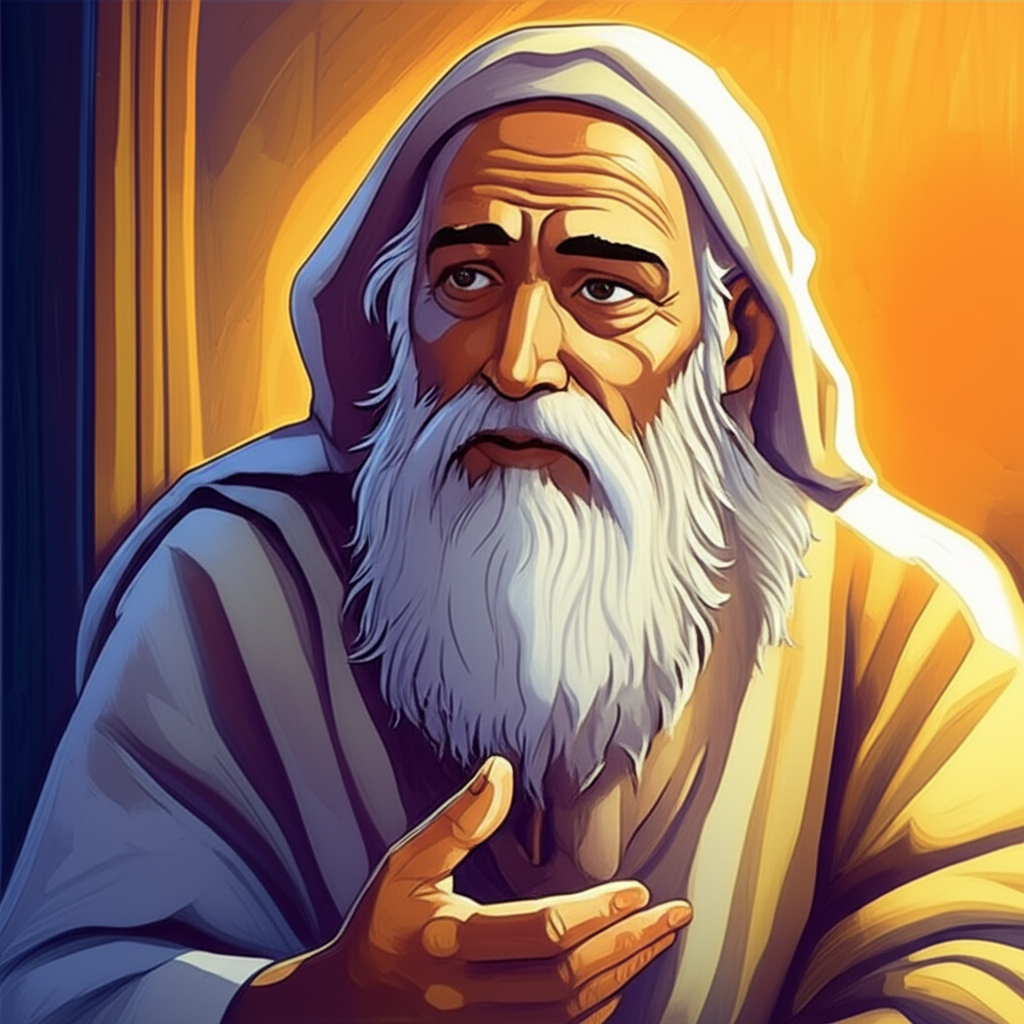


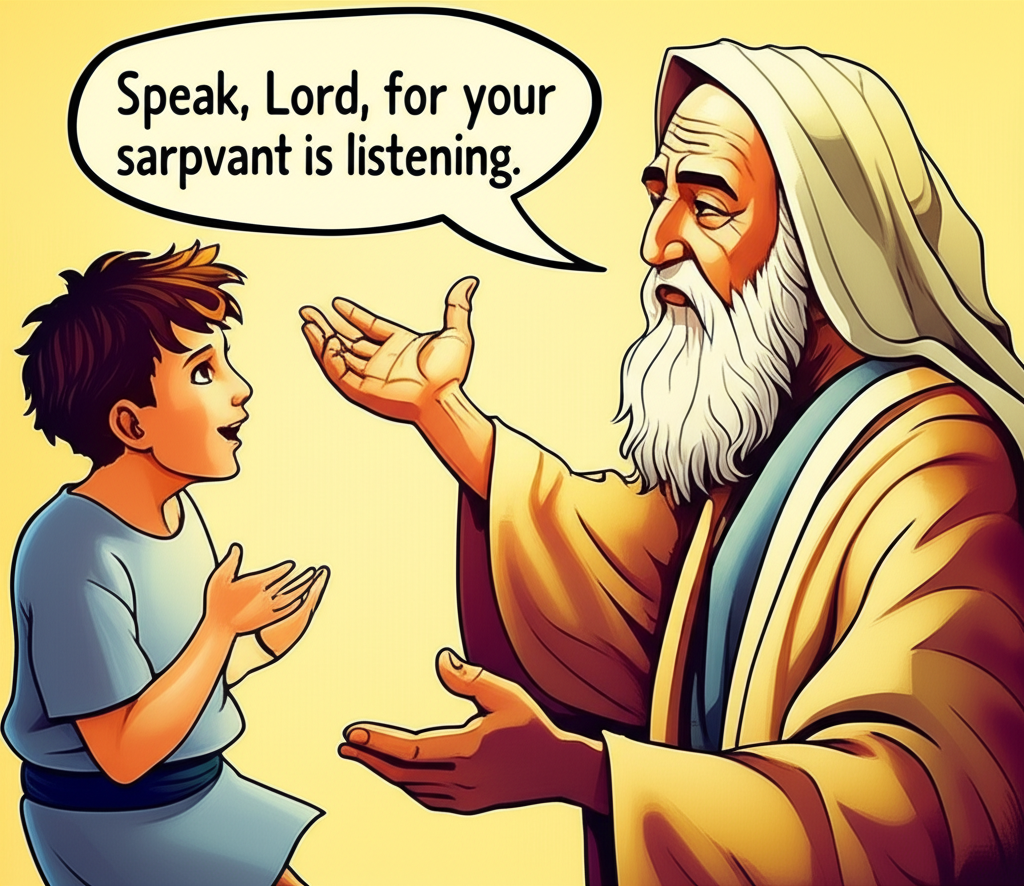

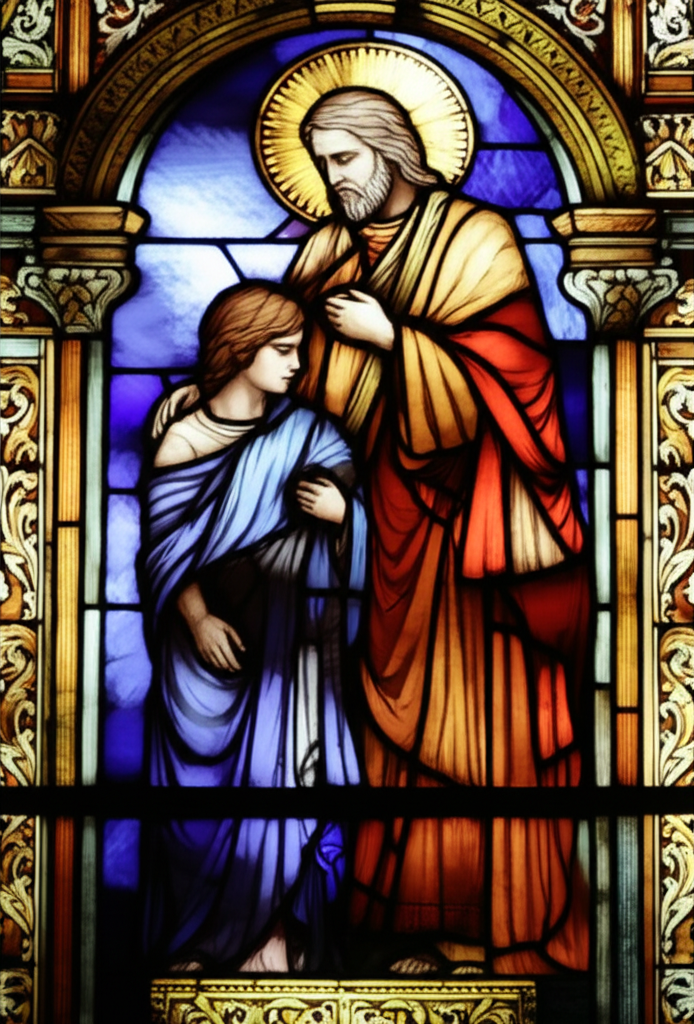
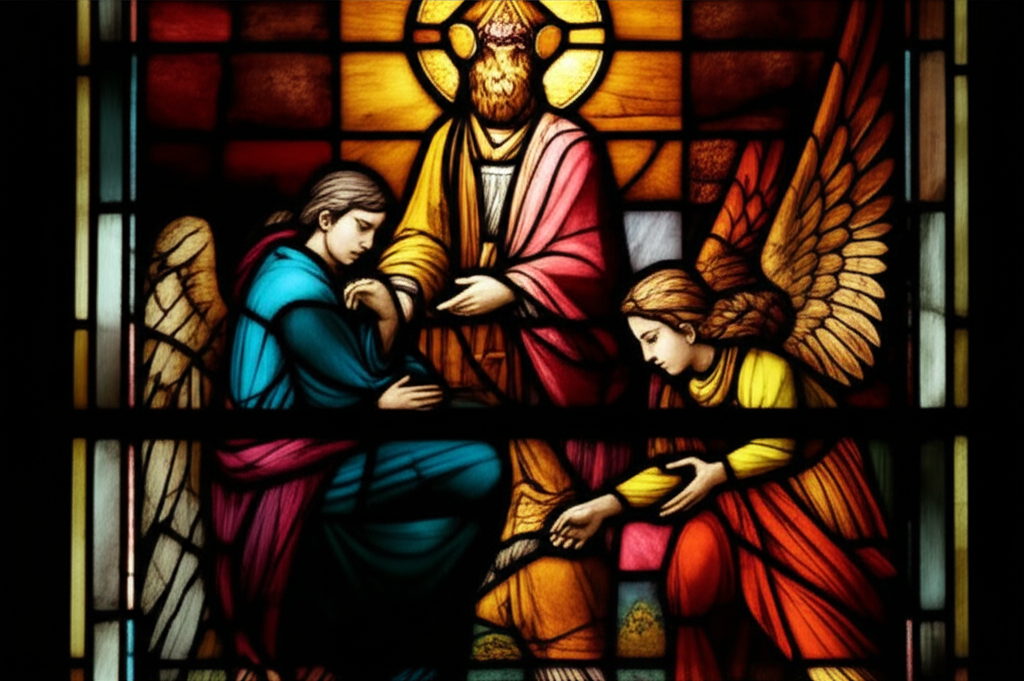
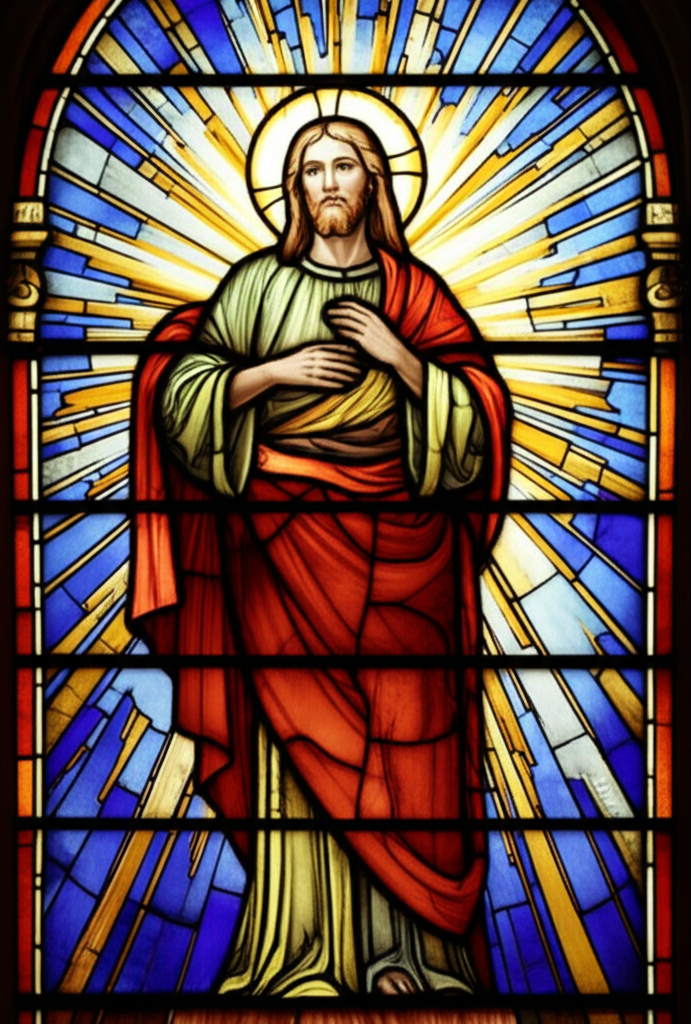
1 Samuel chapter 3 kjv
- 1 And the child Samuel ministered unto the LORD before Eli. And the word of the LORD was precious in those days; there was no open vision.
- 2 And it came to pass at that time, when Eli was laid down in his place, and his eyes began to wax dim, that he could not see;
- 3 And ere the lamp of God went out in the temple of the LORD, where the ark of God was, and Samuel was laid down to sleep;
- 4 That the LORD called Samuel: and he answered, Here am I.
- 5 And he ran unto Eli, and said, Here am I; for thou calledst me. And he said, I called not; lie down again. And he went and lay down.
- 6 And the LORD called yet again, Samuel. And Samuel arose and went to Eli, and said, Here am I; for thou didst call me. And he answered, I called not, my son; lie down again.
- 7 Now Samuel did not yet know the LORD, neither was the word of the LORD yet revealed unto him.
- 8 And the LORD called Samuel again the third time. And he arose and went to Eli, and said, Here am I; for thou didst call me. And Eli perceived that the LORD had called the child.
- 9 Therefore Eli said unto Samuel, Go, lie down: and it shall be, if he call thee, that thou shalt say, Speak, LORD; for thy servant heareth. So Samuel went and lay down in his place.
- 10 And the LORD came, and stood, and called as at other times, Samuel, Samuel. Then Samuel answered, Speak; for thy servant heareth.
- 11 And the LORD said to Samuel, Behold, I will do a thing in Israel, at which both the ears of every one that heareth it shall tingle.
- 12 In that day I will perform against Eli all things which I have spoken concerning his house: when I begin, I will also make an end.
- 13 For I have told him that I will judge his house for ever for the iniquity which he knoweth; because his sons made themselves vile, and he restrained them not.
- 14 And therefore I have sworn unto the house of Eli, that the iniquity of Eli's house shall not be purged with sacrifice nor offering for ever.
- 15 And Samuel lay until the morning, and opened the doors of the house of the LORD. And Samuel feared to show Eli the vision.
- 16 Then Eli called Samuel, and said, Samuel, my son. And he answered, Here am I.
- 17 And he said, What is the thing that the LORD hath said unto thee? I pray thee hide it not from me: God do so to thee, and more also, if thou hide any thing from me of all the things that he said unto thee.
- 18 And Samuel told him every whit, and hid nothing from him. And he said, It is the LORD: let him do what seemeth him good.
- 19 And Samuel grew, and the LORD was with him, and did let none of his words fall to the ground.
- 20 And all Israel from Dan even to Beersheba knew that Samuel was established to be a prophet of the LORD.
- 21 And the LORD appeared again in Shiloh: for the LORD revealed himself to Samuel in Shiloh by the word of the LORD.
1 Samuel chapter 3 nkjv
- 1 Now the boy Samuel ministered to the LORD before Eli. And the word of the LORD was rare in those days; there was no widespread revelation.
- 2 And it came to pass at that time, while Eli was lying down in his place, and when his eyes had begun to grow so dim that he could not see,
- 3 and before the lamp of God went out in the tabernacle of the LORD where the ark of God was, and while Samuel was lying down,
- 4 that the LORD called Samuel. And he answered, "Here I am!"
- 5 So he ran to Eli and said, "Here I am, for you called me." And he said, "I did not call; lie down again." And he went and lay down.
- 6 Then the LORD called yet again, "Samuel!" So Samuel arose and went to Eli, and said, "Here I am, for you called me." He answered, "I did not call, my son; lie down again."
- 7 (Now Samuel did not yet know the LORD, nor was the word of the LORD yet revealed to him.)
- 8 And the LORD called Samuel again the third time. So he arose and went to Eli, and said, "Here I am, for you did call me." Then Eli perceived that the LORD had called the boy.
- 9 Therefore Eli said to Samuel, "Go, lie down; and it shall be, if He calls you, that you must say, 'Speak, LORD, for Your servant hears.' " So Samuel went and lay down in his place.
- 10 Now the LORD came and stood and called as at other times, "Samuel! Samuel!" And Samuel answered, "Speak, for Your servant hears."
- 11 Then the LORD said to Samuel: "Behold, I will do something in Israel at which both ears of everyone who hears it will tingle.
- 12 In that day I will perform against Eli all that I have spoken concerning his house, from beginning to end.
- 13 For I have told him that I will judge his house forever for the iniquity which he knows, because his sons made themselves vile, and he did not restrain them.
- 14 And therefore I have sworn to the house of Eli that the iniquity of Eli's house shall not be atoned for by sacrifice or offering forever."
- 15 So Samuel lay down until morning, and opened the doors of the house of the LORD. And Samuel was afraid to tell Eli the vision.
- 16 Then Eli called Samuel and said, "Samuel, my son!" He answered, "Here I am."
- 17 And he said, "What is the word that the LORD spoke to you? Please do not hide it from me. God do so to you, and more also, if you hide anything from me of all the things that He said to you."
- 18 Then Samuel told him everything, and hid nothing from him. And he said, "It is the LORD. Let Him do what seems good to Him."
- 19 So Samuel grew, and the LORD was with him and let none of his words fall to the ground.
- 20 And all Israel from Dan to Beersheba knew that Samuel had been established as a prophet of the LORD.
- 21 Then the LORD appeared again in Shiloh. For the LORD revealed Himself to Samuel in Shiloh by the word of the LORD.
1 Samuel chapter 3 niv
- 1 The boy Samuel ministered before the LORD under Eli. In those days the word of the LORD was rare; there were not many visions.
- 2 One night Eli, whose eyes were becoming so weak that he could barely see, was lying down in his usual place.
- 3 The lamp of God had not yet gone out, and Samuel was lying down in the house of the LORD, where the ark of God was.
- 4 Then the LORD called Samuel. Samuel answered, "Here I am."
- 5 And he ran to Eli and said, "Here I am; you called me." But Eli said, "I did not call; go back and lie down." So he went and lay down.
- 6 Again the LORD called, "Samuel!" And Samuel got up and went to Eli and said, "Here I am; you called me." "My son," Eli said, "I did not call; go back and lie down."
- 7 Now Samuel did not yet know the LORD: The word of the LORD had not yet been revealed to him.
- 8 A third time the LORD called, "Samuel!" And Samuel got up and went to Eli and said, "Here I am; you called me." Then Eli realized that the LORD was calling the boy.
- 9 So Eli told Samuel, "Go and lie down, and if he calls you, say, 'Speak, LORD, for your servant is listening.'?" So Samuel went and lay down in his place.
- 10 The LORD came and stood there, calling as at the other times, "Samuel! Samuel!" Then Samuel said, "Speak, for your servant is listening."
- 11 And the LORD said to Samuel: "See, I am about to do something in Israel that will make the ears of everyone who hears about it tingle.
- 12 At that time I will carry out against Eli everything I spoke against his family?from beginning to end.
- 13 For I told him that I would judge his family forever because of the sin he knew about; his sons blasphemed God, and he failed to restrain them.
- 14 Therefore I swore to the house of Eli, 'The guilt of Eli's house will never be atoned for by sacrifice or offering.'?"
- 15 Samuel lay down until morning and then opened the doors of the house of the LORD. He was afraid to tell Eli the vision,
- 16 but Eli called him and said, "Samuel, my son." Samuel answered, "Here I am."
- 17 "What was it he said to you?" Eli asked. "Do not hide it from me. May God deal with you, be it ever so severely, if you hide from me anything he told you."
- 18 So Samuel told him everything, hiding nothing from him. Then Eli said, "He is the LORD; let him do what is good in his eyes."
- 19 The LORD was with Samuel as he grew up, and he let none of Samuel's words fall to the ground.
- 20 And all Israel from Dan to Beersheba recognized that Samuel was attested as a prophet of the LORD.
- 21 The LORD continued to appear at Shiloh, and there he revealed himself to Samuel through his word.
1 Samuel chapter 3 esv
- 1 Now the boy Samuel was ministering to the LORD in the presence of Eli. And the word of the LORD was rare in those days; there was no frequent vision.
- 2 At that time Eli, whose eyesight had begun to grow dim so that he could not see, was lying down in his own place.
- 3 The lamp of God had not yet gone out, and Samuel was lying down in the temple of the LORD, where the ark of God was.
- 4 Then the LORD called Samuel, and he said, "Here I am!"
- 5 and ran to Eli and said, "Here I am, for you called me." But he said, "I did not call; lie down again." So he went and lay down.
- 6 And the LORD called again, "Samuel!" and Samuel arose and went to Eli and said, "Here I am, for you called me." But he said, "I did not call, my son; lie down again."
- 7 Now Samuel did not yet know the LORD, and the word of the LORD had not yet been revealed to him.
- 8 And the LORD called Samuel again the third time. And he arose and went to Eli and said, "Here I am, for you called me." Then Eli perceived that the LORD was calling the boy.
- 9 Therefore Eli said to Samuel, "Go, lie down, and if he calls you, you shall say, 'Speak, LORD, for your servant hears.'" So Samuel went and lay down in his place.
- 10 And the LORD came and stood, calling as at other times, "Samuel! Samuel!" And Samuel said, "Speak, for your servant hears."
- 11 Then the LORD said to Samuel, "Behold, I am about to do a thing in Israel at which the two ears of everyone who hears it will tingle.
- 12 On that day I will fulfill against Eli all that I have spoken concerning his house, from beginning to end.
- 13 And I declare to him that I am about to punish his house forever, for the iniquity that he knew, because his sons were blaspheming God, and he did not restrain them.
- 14 Therefore I swear to the house of Eli that the iniquity of Eli's house shall not be atoned for by sacrifice or offering forever."
- 15 Samuel lay until morning; then he opened the doors of the house of the LORD. And Samuel was afraid to tell the vision to Eli.
- 16 But Eli called Samuel and said, "Samuel, my son." And he said, "Here I am."
- 17 And Eli said, "What was it that he told you? Do not hide it from me. May God do so to you and more also if you hide anything from me of all that he told you."
- 18 So Samuel told him everything and hid nothing from him. And he said, "It is the LORD. Let him do what seems good to him."
- 19 And Samuel grew, and the LORD was with him and let none of his words fall to the ground.
- 20 And all Israel from Dan to Beersheba knew that Samuel was established as a prophet of the LORD.
- 21 And the LORD appeared again at Shiloh, for the LORD revealed himself to Samuel at Shiloh by the word of the LORD.
1 Samuel chapter 3 nlt
- 1 Meanwhile, the boy Samuel served the LORD by assisting Eli. Now in those days messages from the LORD were very rare, and visions were quite uncommon.
- 2 One night Eli, who was almost blind by now, had gone to bed.
- 3 The lamp of God had not yet gone out, and Samuel was sleeping in the Tabernacle near the Ark of God.
- 4 Suddenly the LORD called out, "Samuel!" "Yes?" Samuel replied. "What is it?"
- 5 He got up and ran to Eli. "Here I am. Did you call me?" "I didn't call you," Eli replied. "Go back to bed." So he did.
- 6 Then the LORD called out again, "Samuel!" Again Samuel got up and went to Eli. "Here I am. Did you call me?" "I didn't call you, my son," Eli said. "Go back to bed."
- 7 Samuel did not yet know the LORD because he had never had a message from the LORD before.
- 8 So the LORD called a third time, and once more Samuel got up and went to Eli. "Here I am. Did you call me?" Then Eli realized it was the LORD who was calling the boy.
- 9 So he said to Samuel, "Go and lie down again, and if someone calls again, say, 'Speak, LORD, your servant is listening.'" So Samuel went back to bed.
- 10 And the LORD came and called as before, "Samuel! Samuel!" And Samuel replied, "Speak, your servant is listening."
- 11 Then the LORD said to Samuel, "I am about to do a shocking thing in Israel.
- 12 I am going to carry out all my threats against Eli and his family, from beginning to end.
- 13 I have warned him that judgment is coming upon his family forever, because his sons are blaspheming God and he hasn't disciplined them.
- 14 So I have vowed that the sins of Eli and his sons will never be forgiven by sacrifices or offerings."
- 15 Samuel stayed in bed until morning, then got up and opened the doors of the Tabernacle as usual. He was afraid to tell Eli what the LORD had said to him.
- 16 But Eli called out to him, "Samuel, my son." "Here I am," Samuel replied.
- 17 "What did the LORD say to you? Tell me everything. And may God strike you and even kill you if you hide anything from me!"
- 18 So Samuel told Eli everything; he didn't hold anything back. "It is the LORD's will," Eli replied. "Let him do what he thinks best."
- 19 As Samuel grew up, the LORD was with him, and everything Samuel said proved to be reliable.
- 20 And all Israel, from Dan in the north to Beersheba in the south, knew that Samuel was confirmed as a prophet of the LORD.
- 21 The LORD continued to appear at Shiloh and gave messages to Samuel there at the Tabernacle.
- Bible Book of 1 Samuel
- 1 Story of Hannah
- 2 Hannah's song and Prayer
- 3 Story of Samuel
- 4 The Philistines Capture the Ark
- 5 The Philistines and the Ark
- 6 The Ark Returned to Israel
- 7 Samuel Judges Israel
- 8 Israel Asks for a King
- 9 Saul the first king of Israel
- 10 Samuel Anoints Saul as King
- 11 Saul Defeats the Ammonites
- 12 Samuel's Farewell Address
- 13 Saul Fights the Philistines
- 14 Story of Jonathan
- 15 Saul and the Amalekites
- 16 David annointed
- 17 David and Goliath story
- 18 David and Jonathan's Friendship
- 19 Saul Tries to Kill David
- 20 Jonathan Warns David
- 21 David and the Holy Bread
- 22 David in the cav of Adullam
- 23 David Saves the City of Keilah
- 24 David Spares Saul's Life
- 25 Death of Samuel and Abigail
- 26 David Spares Saul Again
- 27 David Flees to the Philistines
- 28 Saul consults the Witch of Endor
- 29 The Philistines Reject David
- 30 David's Wives Are Captured
- 31 Death of Saul